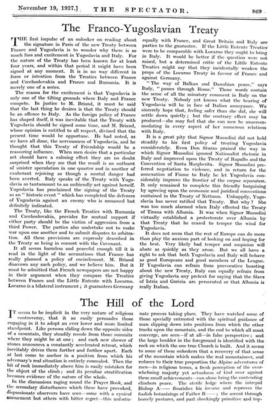The Franco-Yugoslavian Treaty
THE. first impulse of an onlooker on reading about the signature in Paris of the new Treaty between France and Yugoslavia is to wonder why there is so much fuss and excitement in Yugoslavia and Italy. For the nature of the Treaty has been known for at least four years, and within that period it might have been signed at any moment. It is in no way different in form or intention from the Treaties between France and Czechoslovakia and France and Rumania. It is merely one of a series.
The reason for the excitement is that Yugoslavia is only one of the tilting grounds where Italy and France compete. In justice to M. Briand, it must be said that the last thing he desires is that the Treaty should be an offence to Italy. As the foreign policy of France has shaped itself, it was inevitable that the Treaty with Yugoslavia should be signed some time, and M. Briand, whose opinion is entitled to all respect, divined that the present time would be opportune. He had noted, as we have all done, the nervousness of Yugoslavia, and he thought that this Treaty of Friendship would be a reassuring influence. When men desire that a particular act should have a calming effect they are no doubt surprised when they see that the result is an outburst of sinister speculation in one quarter and in another of exuberant rejoicing as though a mortal danger had been averted. Italy speaks of the ,Treaty with Yugo- slavia as tantamount to an unfriendly act against herself. Yugoslavia has proclaimed the signing of the Treaty as an " historic event " which has completed the defences of Yugoslavia against an enemy who is unnamed but definitely indicated.
The Treaty, like the French Treaties with Rumania and Czechoslovakia, provides for mutual support if either party should be the victim of aggression from a third Power. The parties also undertake not to make war upon one another and to submit disputes to arbitra- tion. All these provisions are expressly described in the Treaty as being in consort with the Covenant.
It all seems harmless and peaceful enough till it is read in the light of the accusations that France has really planned a policy of encirclement. M. Briand disavows any such policy, and we believe him. But it must be admitted that French newspapers are not happy in their argument when they compare the Treaties between France and the Little Entente with Locarno. Locarno is a bilateral instrument ; it guarantees Germany equally with France, and Great Britain and Italy are' parties to the guarantee. If the Little Entente Treaties' were to be comparable with Locarno they ought to bring in Italy. It would be better if the question were not raised, but a determined critic of the Little Entente Treaties might say that they incidentally weaken the props of the Locarno Treaty in favour of France and against Germany.
" The way of Balkan and Danubian peace," says Italy, " passes through Rome." Those words contain the sense of all the minatory comment in Italy on the new Treaty. Nobody yet knows what the bearing of Yugoslavia will be in face of Italian annoyance. We sincerely hope that, feeling safer than she did, she will settle down quietly ; but the contrary effect may be produced—she may feel that she can now be unaccom- modating in every aspect of her numerous relations with Italy.
It is a great pity that Signor Mussolini did not hold steadily to his first policy of treating Yugoslavia considerately. Even Don Sturzo praised the way in which Signor Mussolini ignored Nationalist rhetoric in Italy and improved upon the Treaty of Rapallo and the Convention of Santa Margherita. Signor Mussolini pre- ferred negotiation to violence, and in return for the annexation of Fiume to Italy he let Yugoslavia con- siderably improve the frontier of the corpus separatum. It only remained to complete this friendly bargaining by agreeing upon the economic and juridical conventions contained in the Treaty of Nettuno. Unhappily, Yugo- slavia has never ratified that Treaty. But why ? She was too much alarmed when Italy effected the Treaty of Tirana with Albania. It was when Signor Mussolini virtually established a protectorate over Albania by that Treaty that he ceased to temper the wind for Yugoslavia.
It does not seem that the rest of Europe can do more than play the anxious part of looking on and hoping for the best. Very likely bad temper and suspicion will abate as quickly as they arose. But we all have a right to ask that both Yugoslavia and Italy will behave as good Europeans and good members of the League.' If Yugoslavia can refrain from provocative boasting about the new Treaty, Italy can equally refrain from giving Yugoslavia any pretext for saying that the Slays of Istria and Gorizia are persecuted or that Albania is really Italian.














































 Previous page
Previous page